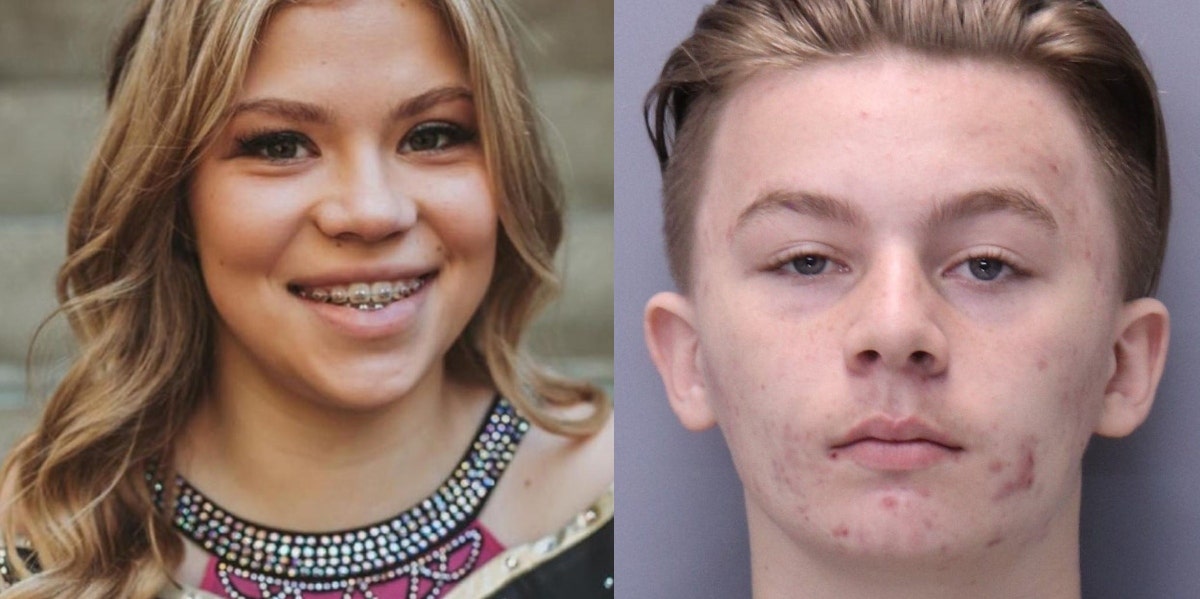Tristyn Bailey Found Dead With 'Karma' Written On Her Ankle After Allegedly Rejecting Aiden Fucci's Advances
The unspoken danger of rejecting men.
 YouTube
YouTube Detectives investigating the death of Tristyn Bailey have released documents that reveal the teenager’s tragic last moments, as told by Aiden Fucci, who stands accused of her murder.
Fucci’s arrest went viral after he took a Snapchat from the backseat of a police car with the caption, "Hey guys has anybody seen Tristyn lately?"
Since then, the 14-year-old has been charged with first-degree murder for Bailey’s death on May 8, 2021 in St. Johns, Florida.
Thirteen-year-old Bailey was stabbed 114 times in the woods near her home on Mother’s Day.
There's new evidence in Tristyn Bailey’s murder.
The new documents revealed interviews with Fucci, his friends, and disturbing evidence found in the home of the alleged murder.
Blood and violent drawings were found in Aiden Fucci’s home.
The documents revealed that police had found bloody clothes and sneakers in Fucci’s bedroom after Bailey’s death.
They also allegedly found "drawings of a violent nature” with a "Satanic element to them." These drawings reportedly included a naked female with blood gushing from her arms. The female had Xs slashed in red over her private parts.
Mysterious drawings were found on Tristyn Bailey’s body.
Though a medical examiner found no signs of sexual assault, there is evidence to suggest Bailey fought her attacker.
Bailey’s body was also reportedly found with the word “Karma” handwritten in blue ink on her left ankle and a "smiley face" drawn on her right ankle. The report does not state how the marks got there.
Aiden Fucci’s friends claim he often talked about murder.
Fucci’s friends told detectives the teen often expressed desires to murder people, "on multiple occasions that he wanted to kill someone by stabbing them or slitting their throat," the documents allege.
According to the report, one of Fucci’s friends told detectives that Fucci had said "if he were to kill someone, it was going to be planned, he would find a random person walking at night, drag them into the woods, and stab them."
Fucci claims Bailey rejected him.
The documents state that Fucci told investigators that he had kissed Bailey on the night of her murder but she rejected his advances.
He allegedly went on to claim that he had pushed her and she hit her head. He also added that he became angry and told her to "F off" and then left.
The report also states that when police told the teen that Bailey’s body had been found, Fucci allegedly replied, "How is that my problem?"
The unjust danger of declining a man’s advances.
The details of Bailey’s final moments evoke a fear all too familiar to many women and are a painful reminder that simply rejecting unwanted male advances can be life-threatening for women and girls.
Her death is the end result of a dangerously sexist assumption that women exist only for the pleasure of men, and any rejection of unwanted advances makes them worthless and deserving of violence.
This so-called motive for violent crime is heinous and shocking, but it’s far from an anomaly.
In 2014, Elliot Rodger murdered six people and wounded 13 in the University of California at Santa Barbara community before taking his own life.
Rodger detailed the plans for the killing spree in a 137-page manifesto and a YouTube video, describing “retribution” to punish women, “hot girls” in particular, for denying him the sex life he said he “deserved.”
In 2016, 18-year-old Jakob Wagner shot two fellow students at his high school prom. Sources relayed a possible motive: "A lot of people think he did this because his girlfriend broke up with him."
Keya Murthy, a life coach and neurolinguistic expert based in California, tells us that boys are conditioned to feel deserving of women, without respecting the individual boundaries of the women they pursue.
“This dangerous entitlement is an extension of the old paradigm of ‘boys will be boys.’ The books children read growing up, and with the advent of movies watched growing up, shows that a girl is helpless and needs to be saved by a prince who kisses her,” she tells us.
Bailey’s death complicates the victim-blaming many survivors of assault experience when they are told to just deny advances or speak up in uncomfortable situations.
“Women who 'just say no' could be saying no to a murderer disguised as a prince and she doesn't know it,” Murthy adds.
Bailey’s rejection of Fucci was the death sentence many women fear in their daily interactions with controlling, entitled men, and exposes how violence against women can only be ended by re-educating men rather than by expecting women to rebuff unwanted advances.
Alice Kelly is a writer living in Brooklyn, New York. Catch her covering all things social justice, news, and entertainment. Keep up with her Twitter for more.

